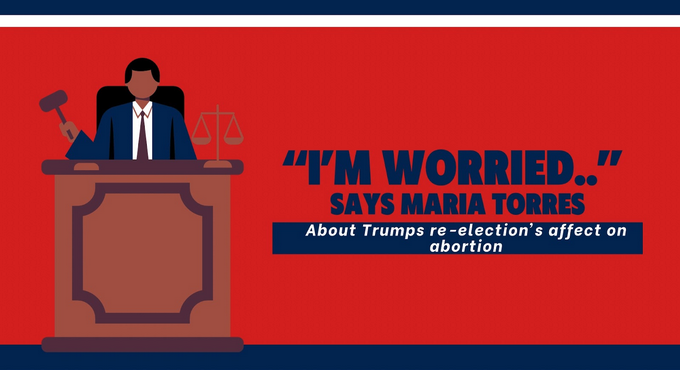Voters reelected Donald Trump president on Nov. 5, sending the former president to the White House for a second term and leaving many New Mexicans wondering how the political shift will affect abortion rights in the Southwest.
Though New Mexico has long been a stronghold for abortion access in the Southwest, a second Trump term has renewed concerns among abortion rights advocates about the future of reproductive freedoms in the state.

“I’m worried about my daughters, and my daughters’ daughters,” Maria Torres, a 30-year resident of Albuquerque, said. “If essential healthcare is taboo, women will be afraid to access sometimes life-saving procedures, or they may lack access entirely.”
In 2022 the U.S. Supreme Court overturned Roe v. Wade with the Dobbs decision. This sent abortion policy back to individual states, and New Mexico is one of a few states that allow women to have an abortion without restrictions.
In New Mexico, women over the age of 13 can legally get an abortion without permission from their parents, and providers like Planned Parenthood offer confidentiality when providing services.
Kamala Harris won New Mexico 52% to 46%. Four years earlier, Joe Biden beat Trump in New Mexico with a slightly higher margin of 54% to 44%. This uptick of conservative-leaning voters in the state has some New Mexicans worried that the Trump administration will encourage the passing of anti-abortion laws in the Land of Enchantment.
“To be completely honest, the election sort of sparked this pit in my stomach,” Torres said. “There’s a lot of swing states voting red and I’m worried New Mexico will turn too.”
While the state’s Democrat-controlled legislature has taken steps to safeguard reproductive rights, the future of those protections may depend on the balance of power at the federal level.
Kelly Baden, the Vice President of policy at the Guttmacher Institute, told ABC News that abortions will only become more inaccessible.
“An already harmful abortion access crisis will likely get worse,” Baden said. “The 13 states that currently ban abortion — there are real consequences to that including death. Women are dying from these abortion bans.”
According to the World Health Organization, nearly 6 out of 10 pregnancies result in termination, with 45% of abortions deemed unsafe.
New Mexicans like Amanda Montoya are concerned with the potential for increased fatalities with more strict abortion laws.
“A lot of women are ashamed of getting an abortion already,” Montoya said. “It’s already looked down on. If we start making it more inaccessible, I can totally see an influx of deaths from botched home abortions.”

Trump’s views on abortion have shifted throughout his campaign, something that has frustrated many anti-abortion rights groups pushing for a national ban on abortion.
Trump played an integral role in reversing Roe v. Wade, and in giving states the right to vote on how much access to abortion their citizens would have. Trump also appointed three justices to the U.S. Supreme Court that have voted to unwind access to abortion, something Trump has taken credit for in interviews during his campaign.
In the aftermath of the ruling, many states have prohibited almost all abortion, particularly states in the Bible Belt — the parts of the South and Midwest where conservative Christian beliefs prevail. Currently, Missouri, Idaho, Louisiana, Kentucky, Alabama, Indiana and Arkansas do not allow abortions unless it is to save the mother’s life.
Trump said the court’s landmark decision means the issue is now left up to voters in the states.
“My view is now that we have abortion where everybody wanted it from a legal standpoint, the states will determine by vote or legislation, or perhaps both, and whatever they decide must be the law of the land,” he said in a video posted to CBS News in April.
In a presidential debate against Harris on Sept.10, Trump said he would not back a federal abortion ban but would like to restrict abortions after 15 weeks.
“I’m not signing a ban,” Trump said. “There’s no reason to sign a ban because we’ve gotten what everybody wanted. Democrats, Republicans and everybody else. And every legal scholar wanted it to be brought back into the states.”
Trump’s claim that “legal scholars” wanted Roe overturned is unfounded and opinion polls have consistently showed that a large majority of Americans did not want Roe terminated.
Trump will assume office Jan. 20, and the next four years of his presidency will likely have lasting effects on abortion rights in the Southwest.
Montoya said she is both worried and excited about future policies in women’s reproductive health.
“I am sympathetic and afraid for those women who will suffer not only here in New Mexico, but especially in the southern parts of the U.S. where they are the most strict,” Montoya said.